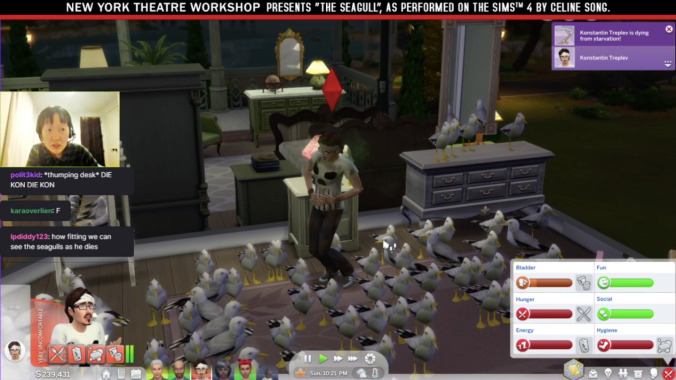Watching Chekhov’s The Seagull via The Sims is riveting theater

Okay, we get it. This might seem like a bit of a niche story. Some people will see the words ‘Chekhov’ and/or ‘The Sims’ and their eyes will glaze right over. If you are such a person, fine, but if you are also a person who cares about pop culture—and your visit to this very website would suggest you are—then stick around and let’s get real artsy-fartsy for a few minutes.
Over the course of two nights as a part of New York Theater Workshop’s virtual 2020-21 season, playwright Celine Song staged a production of Chekhov’s The Seagull via a Twitch stream of The Sims 4. It is, given just a little patience, absolutely riveting, and in New York Magazine, theater critic Helen Shaw does a marvelous job of explaining why.
“We must have new forms,” says Konstantin, the tormented writer hero of Anton Chekhov’s The Seagull. Desperate for approval, Konstantin (Kostya to his friends) boils with “guy from my MFA” energy. He’s sure he’s underappreciated, though his aesthetic revolution sounds a lot like unoriginal dreck. You can see him, can’t you? Glasses, a little beard, a T-shirt with a skull on it?
At least that was the Konstantin collaboratively assembled in Celine Song’s (actually revolutionary) The Seagull on The Sims 4. One of the offerings from New York Theatre Workshop’s virtual season, Song’s two-night, nearly six-hour Seagull was head and wings above other experiments in digital theater. It was often deeply absorbing, if in its second half occasionally exhausting. At every moment, though, it felt like a brand-new genre, confident and fully formed at birth.
Shaw is not exaggerating here. The layers have layers. Watch Song’s Seagull for more than a few minutes and you may find yourself just idly thinking things like “but what if the essence of theater as a communal experience has nothing to do with shared physical space, but the collaboration of mutually creating and then entering into the same emotional space?” while also thinking, “no, actually I don’t think Konstantin would wear that bracelet, he’d either wear too many bracelets as some kind of statement or wear nothing on his wrists, also as some kind of statement. But the skull T-shirt is perfection.”
Theater is always a communal and individual experience; that’s true of all art (the creator of the art + the person seeing or experiencing the art = two people minimum) but it’s especially true of the performing arts. You don’t need to be familiar with The Seagull, which first appeared on the boards in 1896, to understand how wild it is to buy a ticket to a theater performance, then watch the playwright/adaptor, who is also the director and also the only human performer, do costume design for her characters in real time, while responding to feedback from the waiting audience. As a result, the process by which Song created the characters—a process both deliberate and randomized—is, all by itself, incredibly engaging. (Jump to around 25 minutes if you want to skip right to the costuming/character development section.)
Here’s a link to night one (costume stuff included); some technical problems during night two resulted in two streams, one long one and one short one. If you just want to catch the big climax, that’s in the shorter one. But as is so often the case with theater, it seems there’s just no recreating the live experience, even when it’s also a Twitch experience. Here’s Shaw again:
What was and wasn’t in her power seemed to change every minute: She could set up romantic dates, or summon the group to watch a little performance, but unprompted interactions could also be shockingly Seagull-esque. The Sims are their own improv troupe, throwing their own contributions into the mix, and it felt as if they had read the play too. The performance attendees were a pain to corral, just as they are in the original’s Act I. Sim Masha and Sim Trigorin had a spontaneous conversation “about old times,” at just the same moment that they do in the play. The taxidermied seagulls in Konstantin’s room kept glitching, flashing in and out as the character’s mental state deteriorated. Chekhov was in the code, laughing.
Wild. Wilder still: the chance to feel genuinely excited about the future of theater at a time when it a future for theater can be difficult to imagine. Also, the glitchy seagulls are righteous.
Send Great Job, Internet tips to [email protected]